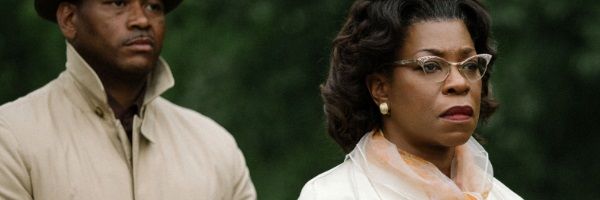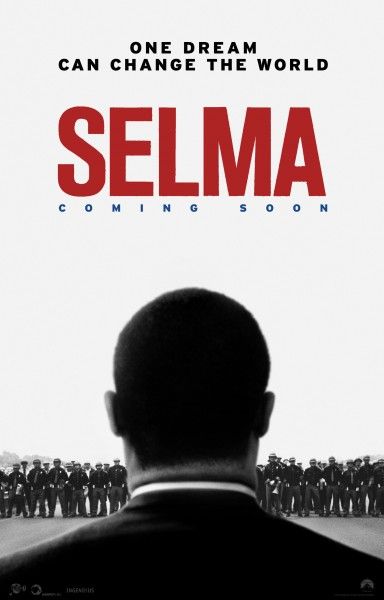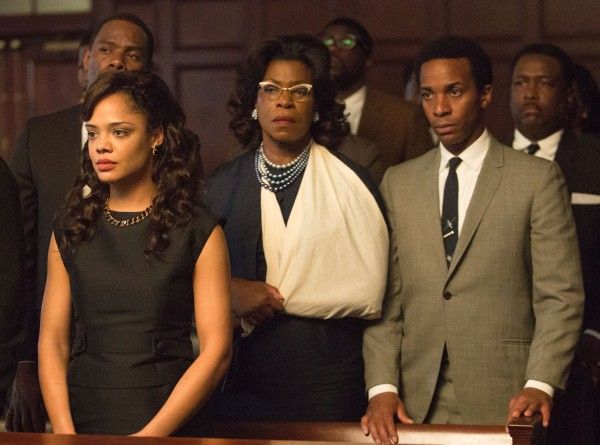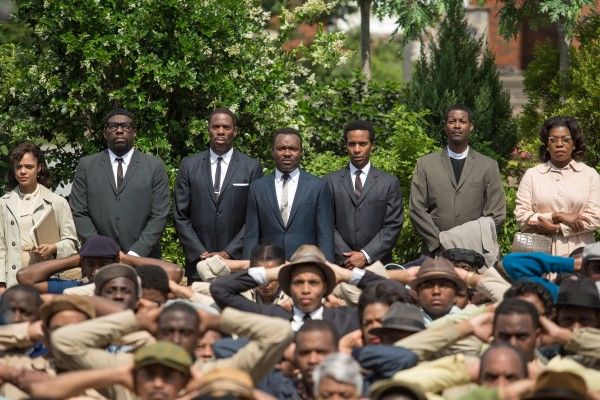Selma is a beautifully designed film that not only hits you emotionally in the gut, but also makes you feel for the humanity that the Civil Rights movement was fighting for. While Martin Luther King Jr. was just a man, he spoke for and to people willing to defy intimidation, face economic retaliation, and endure arrests and beatings, all in hopes of provoking a transformative confrontation that would give African Americans the basic rights that they so desperately wanted and deserved. Expertly directed by Ava DuVernay, the film stars David Oyelowo (in an award-worthy performance as Dr. King), Carmen Ejogo, Tom Wilkinson, Tim Roth, Oprah Winfrey, Andre Holland, Common, Giovanni Ribisi, Tessa Thompson, Dylan Baker, Alessandro Nivola and Omar Dorsey.
During a roundtable interview at the film’s press day, actress Lorraine Toussaint (who plays key Civil Rights figure Amelia Boynton) talked about the aspects of the woman she portrayed that there just wasn’t time to explore in this film, getting to spend time with the real woman behind the character, going from playing the beacon of darkness on Orange is the New Black to the beacon of light in Selma, what she hopes young people get out of seeing the film, and bringing her daughter with her to the set. Check out what she had to say after the jump.
Question: Did you feel like there was just so much about Amelia Boynton that we didn’t get to learn in this film, that could really fill its own movie?
LORRAINE TOUSSAINT: Pivotal scenes of mine were cut, that would have helped explain her in a better way. We don’t really know that she’s the character that invited Martin to Selma, and that she is the one that almost single-handedly had been prepping this community for years. She was relentlessly registering people to vote, and holding secret night classes to tutor the voters. She was prepping this community and building up the pressure in it, very quietly. By the time you meet her, she had been arrested countless times. She’d been harassed and beaten up, within this community. So, by the time Martin comes in, it was ready to blow and she knew that. She knew that once he came in, it would be the thing to tip it, and in that tipping would be that very small window of change. She was very, very smart. She’s 103 now, and I met her.
What was it like to meet the real woman behind the character you were playing? How did that help you in your preparation?
TOUSSAINT: Everyone came together around Ava [DuVernay] because that’s what Ava does. It’s a film of cameos, which is lovely, and a selfless commitment to the work. She also attracted the real-life people. They would show up on set and talk. We would literally be sitting on the floor at their feet because they talked about what it was like to be 20-something and changing the world with Martin, and what it was like when no one was looking and no one was there. And they talked about Amelia. She was a school teacher. Even back then, they referred to her as Ms. Amelia. They were in their 20s and Amelia, at the time, was about 50, so she was the den mother. So, listening to them was part of the preparation. I also did a lot of reading. I read her autobiography. I looked for a lot of photos, but there weren’t a lot of photos of her or any of the other women that were in the forefront of history. Yet again, they were looked over, and there were so many of them. But there were pictures of Amelia, so I was able to see her back then. And then, there were a lot of recordings of her. God bless YouTube. What did we do before stuff like YouTube? Anything you need, you can get on YouTube. It’s wacky. There were all of these downloads of Miss Amelia doing different speeches and interviews. She had a particular way of talking. She was very clipped, all the time.
I mostly did a lot of research on the period. I’m very, very visual, so I watched a lot of documentaries. Most of it is just getting in that headspace. As a modern woman, there are things I take for granted, and that shows up in the way I sit, the way I walk, the way I think, and what I know to be possible. I had to systematically subtract that and see what was left. You pare way down, and then you empower that. You empower a woman of her time, so you have to know what that means. And then, to meet Amelia Boynton now, she has seen the world change in so many extraordinary ways. To feel her as a woman of this time was humbling. I was very starstruck. I asked very stupid questions. I thought I was going to ask all of the important questions, but we talked about recipes and gardening and flowers, and anything she wanted to talk about. Part of it was just being in her presence.
We actors are superstitious creatures. We do all the homework and we put all of the components together, but there’s always one key aspect that we’re not in charge of, really, and that’s magic. You are always on the lookout for where and how that magic is going to ignite. When you have worked as much as I have and have sought it out as often as I do, you get very clear that it will come at very, very odd, unexpected moments. My job is to be on a constant state of alert for when it does show up. It’s never not shown up, but it does show up in odd ways. When you’re playing a real character, you want to honor that person and receive inspiration from that person. They need to anoint you in some way that allows you to borrow just a small piece of their soul. That is the flame.
And so, when I was in her presence, even though I was heavily into it, I was still very moved to feel that transference from her to me, and a validation of the moment. Because she was of a different generation, she brought Martin in to do what Martin does. This is her community and these are her people. When her husband, who was also an activist, died, it was one of the few times that all of the black people did not go to work that day, and en masse, went to his funeral. The price of that, in that community, was extraordinary. That’s how they were loved, in that community. So, she took a backseat to Martin because she knew that was the one that was going to do what needed to be done. In many ways, that’s what we all did in the film. We all were clearly and actively in service to this piece of work.
You’ve recently gone from playing the character who is the beacon of darkness on Orange is the New Black, to playing the beacon of light in Selma. What is that like?
TOUSSAINT: I’ll give you the real answer. The light and the dark are the same. They share. They really do rub up against each other, and they are extraordinarily familiar with each other. They are actually friends. So, it’s not difficult for me to move from one to the other. They’re intimate friends. That’s why. You cannot have one without the other, and they must be equally honored.
What would be your hope for young people who see this film?
TOUSSAINT: So many young people feel powerless. We live in a world where it feels like it’s so big and yet so small, and that your contribution really doesn’t matter. When I look at the people in this film, they were so young. They were in their 20s and early 30s, and they changed the world. They lobbied around a cause that they were willing to die for. I’ve always envied the Civil Rights era because I think it was the last time in American history where there was a moment in time where many, many, many people were willing to lay down their lives. Short of my daughter, I’m not sure that I would be willing to lay my life down for an idea that has come to its time. It isn’t often in history that that happens. But I would like to hope that there are young people, especially, that could look at this film and go, “My god, they were so young. Look what they did. Is there something that is important enough in my life to really fight for and stick with and question?” I have a 10-year-old and, to my detriment, I keep insisting that she question authority, and then I realize why they used to beat us. Oh, my god! Young people are asleep. We’ve found lots of ways to dumb us down. A lot of our young people are sleep-walking, dreaming that they’re awake, and lots of aspects of society initially go about keeping it so. I hope that this film touches someone and begins to awaken them.
How does being involved in the creation of a great film like this change you?
TOUSSAINT: That idea gets in the way. I was constantly having to put that aside, on this film. When you’re standing on the Edmund Pettus Bridge, and you look at those muddy waters down below and know that there are bones down there, it’s hard to not be aware of this moment in history, but you can’t play history and you can’t play historical characters. You just have to reduce it to the ordinary. The ordinary is ultimately what moves us most deeply. It’s what touches us, and it’s what we most recognize, in great moments of art. It is the ordinariness of us that is the same in all of us. I don’t know how it changed me, but I did take my daughter with me. I didn’t want her to learn from the Civil Rights movement from a book in middle school, for a couple of chapters. I pulled her out of school for two months and said, “Instead of that, come walk where Martin walked. Come stand on that bridge. Let’s see what rural Georgia really looks and feels like. Come meet some of these people that we’re playing, as actors, and explore them and bring them to life.” We read books at night, and we talked about the little girls. So, maybe it’s changed her life.
Did she get to be in the film?
TOUSSAINT: She did. She was an extra, and she’s oh so pleased. I saw the film and, thank god, there’s a moment with her, or my life would not be my own. But, I don’t think she can see it. It’s too violent. I think it will frighten her. I think it will be too much.
Selma opens in limited release on Christmas Day, and nationwide on January 9, 2015.




